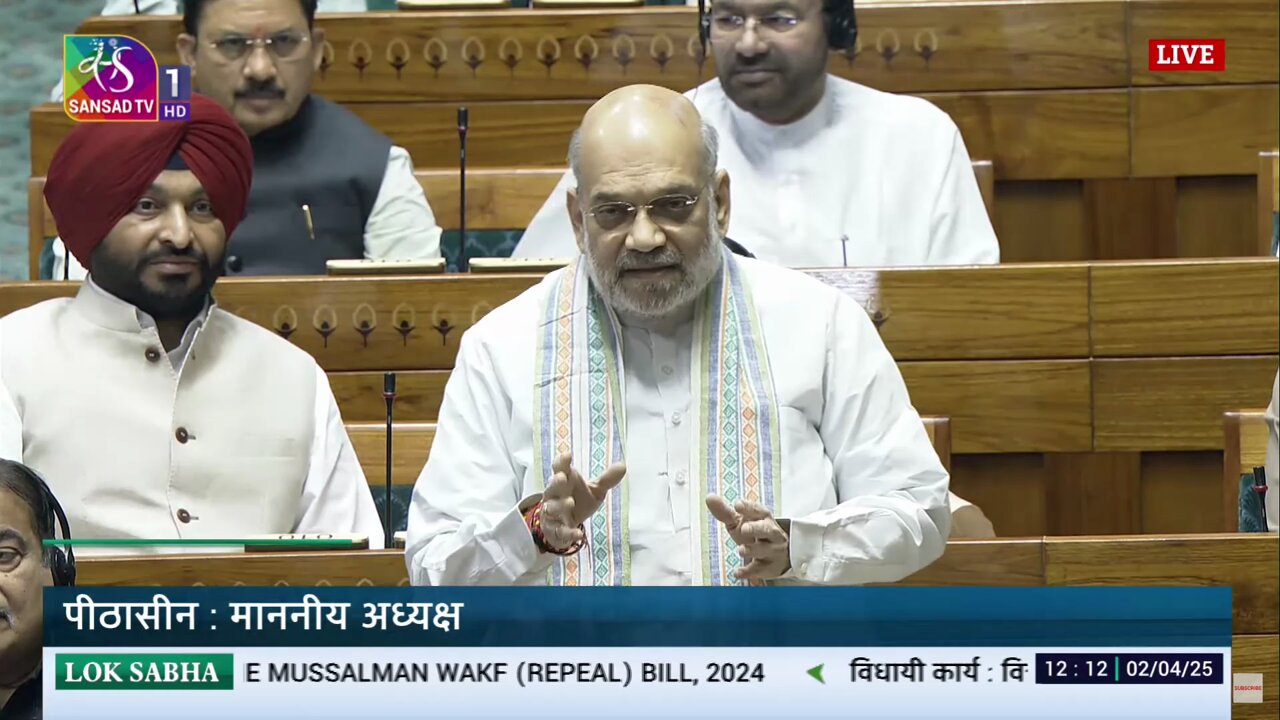"We have democratic committees": Amit Shah slams the opposition for objections on Waqf (Amendment) Bill
Union Home Minister Amit Shah on Wednesday slammed the opposition for raising objections that the government had no power to insert new provisions in the Waqf (Amendment) Bill. He said the bill was tabled after a long process of consultations carried out by the JPC. Shah said the bill was first introduced in August 2024 after which, as sought by the House, it was referred to the JPC, which held long consultations on it. The JPC report was approved by the Union Cabinet before the bill was tabled in the House.
ALSO: We have democratic committees: Amit Shah slams the opposition for objections bill
Calling the Modi government’s deliberations on this bill democratic, he added, “It was your (opposition's) insistence that a Joint Parliamentary Committee should be formed. If the committee wasn't supposed to make any changes... we do not have the kind of committees the Congress had. We have a democratic committee that engages in brainstorming. During Congress's time, there were committees that merely stamped decisions. Our committee discusses, deliberates based on those discussions, and makes changes. If the changes are not to be accepted, then what is the point of having a committee?”
Waqf (Amendment) Bill Tabled In Lok Sabha
Union Minority Affairs Minister Kiren Rijiju on Wednesday tabled the Waqf (Amendment) Bill, 2025, as proposed by a Joint Parliamentary Committee, in the Lok Sabha for consideration and passage. The bill seeks to improve the administration of Waqf properties, introduce technology-driven management, address complexities and ensure transparency.
Introducing the bill, Rijiju said the consultation process of the Joint Parliamentary Committee (JPC) was the largest ever exercise carried out by a parliamentary panel in India's democratic history. He said over 97.27 lakh petitions, memorandums were received by the JPC through physical and online formats and the JPC had gone through each of them before finalising its report.
ALSO: "Will badly affect Muslims": Tamil Nadu CM Stalin urges Centre to withdraw Waqf bill
The minister said as many as 284 delegations submitted their views on the bill besides the Waqf boards of 25 states and Union Territories. Legal luminaries, charitable organisations, academicians and religious leaders, among others, have also submitted their opinions, he said.
"The government is not going to interfere in any religious institution. The changes made in the Waqf law by the UPA government gave it overriding effect over other statutes, hence the new amendments were required," Rijiju said amid noisy opposition protest. "You tried to mislead the people on issues which are not part of the Waqf Bill," Rijiju told the opposition. This bill has nothing to do with religion, but deals only with properties, he added.
 ANI on Twitter / X #WATCH | Waqf (Amendment) Bill taken up for consideration and passing in Lok SabhaUnion Home Minister Amit Shah says, "...It was your (opposition) insistence that a Joint Parliamentary Committee should be formed. We do not have a committee like the Congress. We have a… pic.twitter.com/bbKRTuheft— ANI (@ANI) April 2, 2025 ANI Twitter
ANI on Twitter / X #WATCH | Waqf (Amendment) Bill taken up for consideration and passing in Lok SabhaUnion Home Minister Amit Shah says, "...It was your (opposition) insistence that a Joint Parliamentary Committee should be formed. We do not have a committee like the Congress. We have a… pic.twitter.com/bbKRTuheft— ANI (@ANI) April 2, 2025 ANI Twitter
According to the bill, trusts created by Muslims under any law will no longer be considered Waqf, ensuring full control over the trusts.
As per the bill, only practising Muslims (for at least five years) can dedicate their property to Waqf, restoring pre-2013 rules. Also, women must receive their inheritance before Waqf declaration, with special provisions for widows, divorced women and orphans.
The bill also proposes that an officer above the rank of collector will investigate government properties claimed as Waqf. In case of disputes, the senior government official will have the final say on whether a property belongs to Waqf or the government. This replaces the existing system where such decisions are made by Waqf tribunals.
Also, the bill proposes that non-Muslim members will be included in the central and state Waqf boards for inclusivity. Women must receive their inheritance before Waqf declaration, with special provisions for widows, divorced women and orphans.
(Inputs from PTI)









